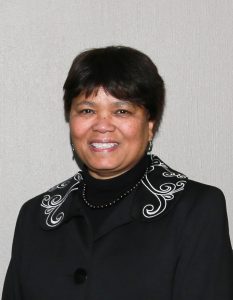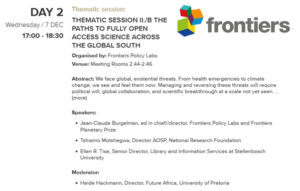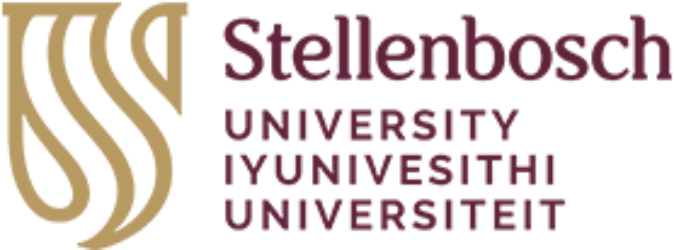[:en]This article was originally published as SU represented at World Science Forum and is authored by Corporate Communication and Marketing Division, SU. It was published on 5 December 2022.

Stellenbosch University’s (SU) Senior Director of Library and Information Services, Ellen R. Tise, will participate in the World Science Forum (WSF) to be hosted by the Department of Science and Innovation in Cape Town from 6 to 9 December. This is the first time this event is taking place in Africa.
Tise received an invitation from Minister of Higher Education, Science and Innovation Dr Blade Nzimande, co-chair of the WSF 2022 steering committee.
 The WSF takes place every two years and attracts scientists from all over the world. Established by the Hungarian Academy of Sciences, in collaboration with the United Nations’ Educational, Scientific and Cultural Organisation (UNESCO), the gathering deliberates on the social and economic relevance, influence and responsibilities of science.
The WSF takes place every two years and attracts scientists from all over the world. Established by the Hungarian Academy of Sciences, in collaboration with the United Nations’ Educational, Scientific and Cultural Organisation (UNESCO), the gathering deliberates on the social and economic relevance, influence and responsibilities of science.
South Africa is hoping to achieve three key goals by hosting the WSF: to promote global debate that inspires action; to provide support for African leadership in global science policy discussions; and to promote South Africa as a strategic partner for global science collaboration in response to societal challenges.
The event will bring together scientists, government officials, industry leaders, media representatives, students from across the world as well as representatives from broader civil society. More than 1 000 people are expected to attend.
Under the theme “Science for Social Justice”, participants will notably consider how the production and application of new knowledge could and should challenge inequality, injustice, environmental destruction, and marginalisation. Debates will not only consider the role of science in advancing social justice, but also how the values of social justice, such as greater transparency and inclusivity, should transform the nature of the scientific enterprise itself, to make it more responsive to the needs of society.
Tise, who will participate in the thematic session entitled “The paths to Fully Open Access Science Across the Global South” on 7 December, regards it as a great honour for herself, SU and the library and information profession.
“As libraries our role is to contribute to the right to information and education, serve communities on the margins and provide safe spaces for the vulnerable. Our services extend to all, irrespective of religion, ability, disability, race, social standing and class. We regard ourselves as active participants in the social justice arena. This role of libraries in social justice has been given more prominence by our Open Access initiatives,” said Tise.
She continued: “This particular panel will showcase the expertise that exists in South Africa, at SU and in the continent. In a sense it also means one is being recognised for your expertise.”
The panel will discuss the obstacles and challenges that the international community, researchers and libraries face to transition to an open science environment. It will also try to chart pathways that will make this transition a seamless one.

By making research from academic and research institutes freely available, open science has great potential to, among other things, facilitate collaborations and partnerships to address societal problems. Currently, most of the research that has been published is commercialised, giving rise to unequal access to information between the rich and the poor, especially between the Global North and the Global South.
“My contribution (in the discussion) will be to raise awareness about the unique challenges faced by Global South researchers and librarians alike in realising the transition to open science.”
“Our resolve is guided by the belief that open access publishing will advance the protection of equal access to civil liberties, rights, and opportunities. We hope to play a part in deconstructing those structures that perpetuate inequality, exclusion, and marginalisation that we face in the Global South.”
Tise is a past president of the International Federation of Library Associations and Institutions (IFLA) (2009-2011) and of the Library and Information Association of South Africa (LIASA) (1998-2002). She is the current Chair of the IFLA Advisory Committee on Freedom of Access to Information and Freedom of Expression, and Chairperson of the South African National Library and Information Consortium Board of Directors. She served on other major library and information bodies, including the Bill & Melinda Gates Foundation Access to Learning Award Advisory Committee in 2007. Tise was appointed to the UNESCO International Advisory Committee of the Memory of the World for a four-year period from 2011-2015 and served as Chair of the Board of the National Library of South Africa from 2012-2015.
Photograph of Ms Tise: Library and Information Service, SU
Extract of programme: World Science Forum 2022 website[:]
